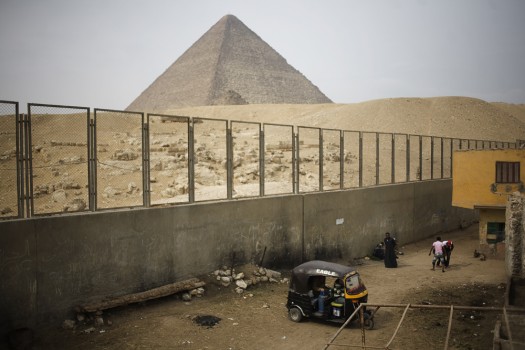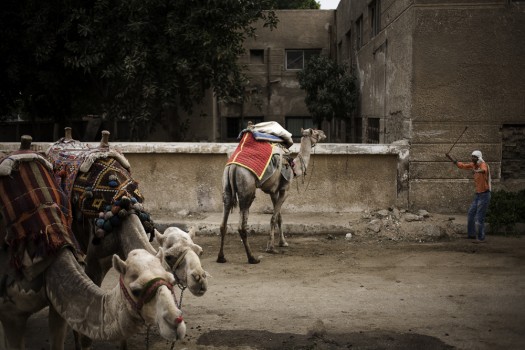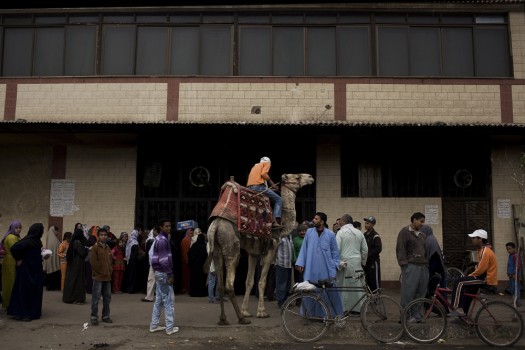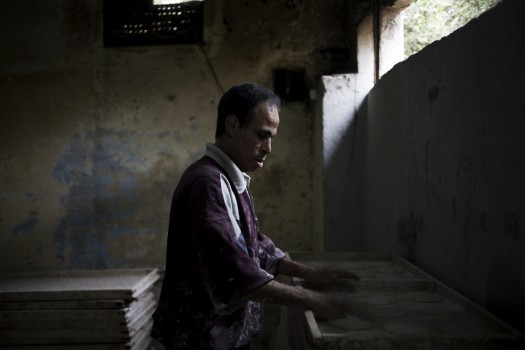
Cairo Journal: February 5

Egyptians in the Pyramid Giza neighborhood, outside of Cairo, have completely lost their main source of income due to resent unrest in the city—causing most residents to support Mubarak. (Nadia Shira Cohen for VQR)
The pyramids jutted out from the hilly patch of cordoned off yellow sand. Camels roamed and men galloped by at full speed on horseback. It felt like an empty Hollywood movie set. One of the camel drivers agreed to meet us on the rooftop above his stable, just yards from the fence walling off their compound from the grounds of the pyramids. He told us what many already suspected: that the men who rode violently into Tahrir Square last Wednesday on camelback had come from Giza. (This was later confirmed by a friend who had witnessed them riding on the road from Giza to Cairo just before the violence occurred.) I had heard rumors that they were paid off by Mubarak to create an air of chaos and send a message—but it seemed simpler than that. The people of Giza, for the most part, wanted the protesters in Tahrir Square to go home, because the unrest has killed off their business.
Indeed, there were no other foreigners around. Seen as potentially the only customers—two crazy tourists—we were mobbed by salesmen selling cheap turbans. Otherwise, the streets were dusty and empty, save for the lively bread line with women haggling over pitas. Bread prices, already sky-high, have risen five fold since the start of the unrest. One camel driver we spoke to said he had begun slaughtering his camels and selling them for meat. I hadn’t expected to find this kind of poverty so close to the pyramids. I imagined a developed area meant to appeal to the stream of tourists typically frequenting such a precious archeological site. What I saw looked more like the favelas of Rio de Janeiro than Disney Egypt.

Abdelaziz Ibrahim Fayed’s camels in front of his perfume shop in the Pyramid Giza neighborhood. He has been having extreme difficulties with his business since the unrest scared away tourists. (Nadia Shira Cohen for VQR)

Egyptians wait in line for bread in the Pyramid Giza neighborhood. Abdelaziz Ibrahim Fayed, on camelback, looks for potential buyers for his camel. (Nadia Shira Cohen for VQR)
In one sense, it was good to see the area so untouched by Americanized ideas of the tourist trade, but it also gave me a bit of a window into the adversaries of this revolution. Kids and adults alike hung around in the unpaved streets, unsure what to do, only certain that their normal lives have been severely disrupted. Last week, some international news organizations were speculating about the possibility of a civil war ensuing among Egyptians, yet what I heard was not political disagreement, but more pressing frustration at the economic collapse—and, now, a threat to the tourist industry. Many disagree with the injustices of the Mubarak regime—some have even been victims of wrongful detentions—but, to their minds, the immediate problem is the protesters of Tahrir Square and the crowds of foreigners at Cairo airport, lining up to flee the country.
I asked one Egyptian if he thought Mubarak should step down now or wait out his term. He said he felt that the only way the country would remain secure through this period of chaos was with Mubarak in power. He said that just the day before he had been watching on TV the reporting of an explosion near the Sinai border—although it later was revealed that it had been a gas leak. State TV emphasized swift government response and investigation and questioned how such cases would be handled without Mubarak. For many Egyptians, this is their only source for news, their only information on the motives and conduct of the protesters.
These psychological games were designed to instill a sense of fear among the people. For a while, it worked. It seemed as though Mubarak would forever keep pulling rabbits out of hats—from the initial setting free of dangerous state criminals who have been terrorizing the country to the intimidation of journalists and violence carried out by state police forces against the protesters. Yet, the revolutionaries remained in Tahrir Square and kept growing in number each day. Mubarak now, as this entry is prepared to be posted, has finally stepped down. What this will mean for the camel drivers of Giza or the millions of other poor Egyptians suffering under the country’s crippled economy remains to be seen.

A baker, who gave only Abdulah as his name, prepares pitas for the oven in his bakery in the Pyramid Giza neighborhood. The price of staples to make pita bread has soared in recent weeks—and fewer and fewer Egyptians have been able to afford such basic necessities. (Nadia Shira Cohen for VQR)

